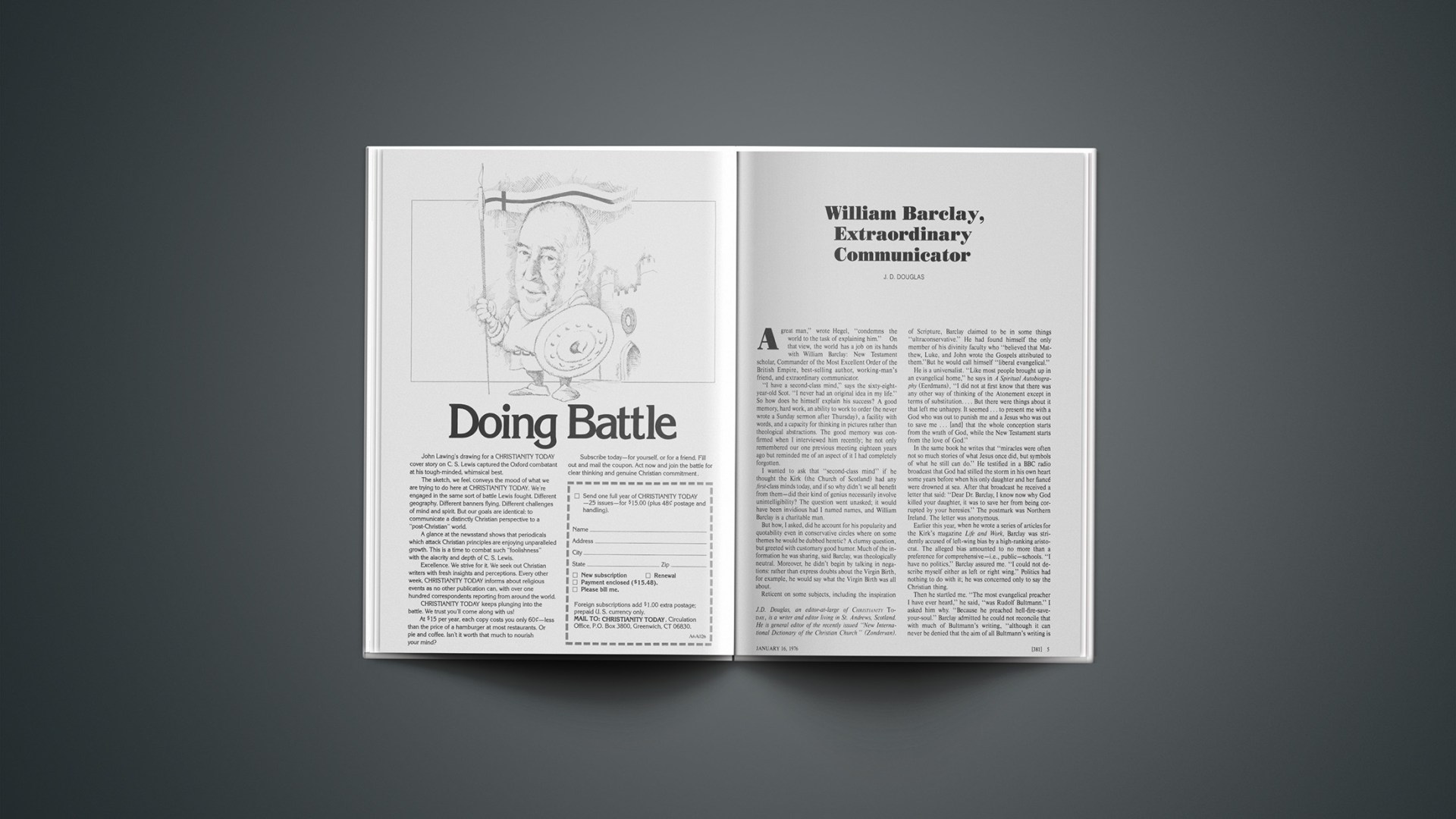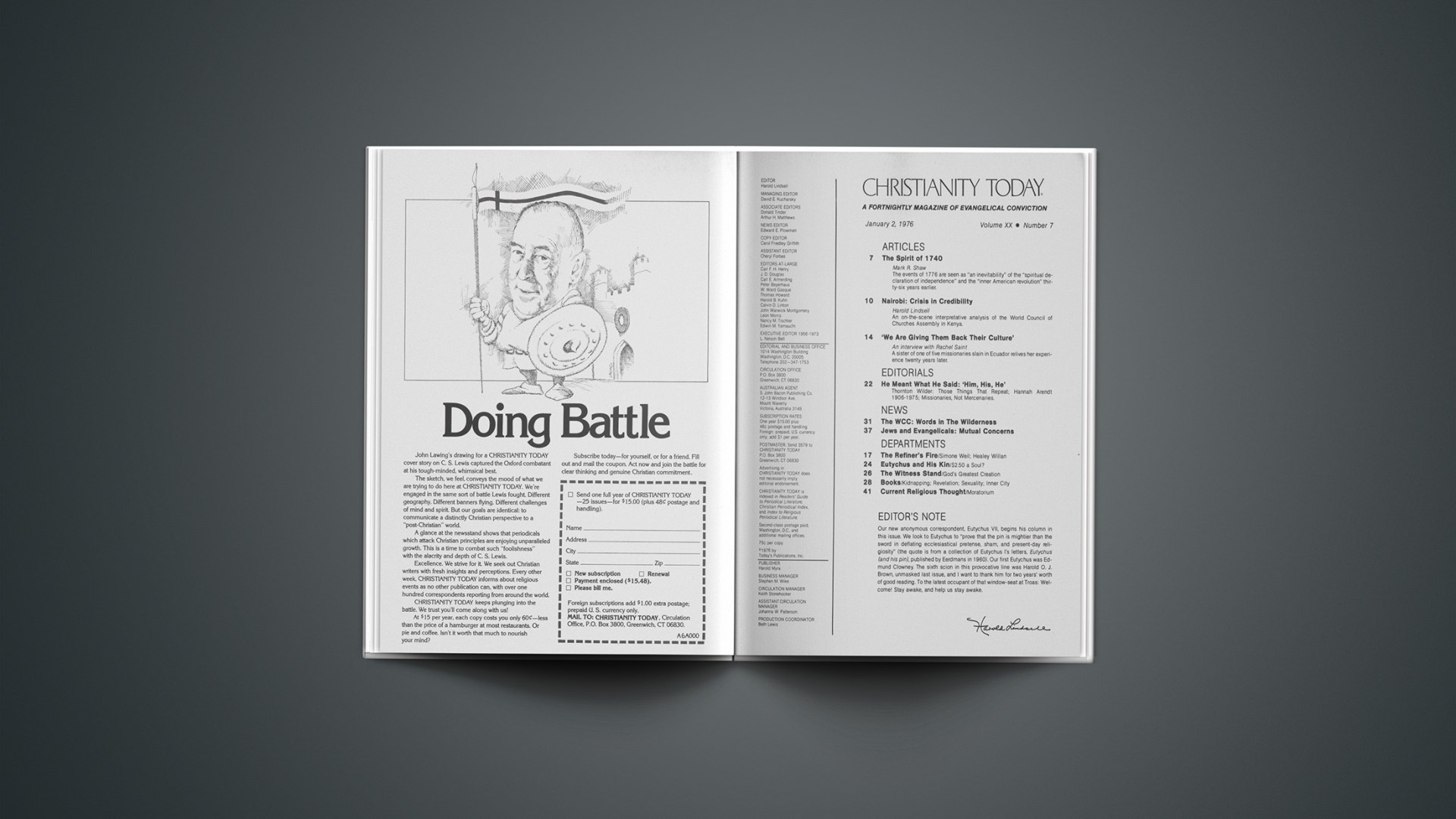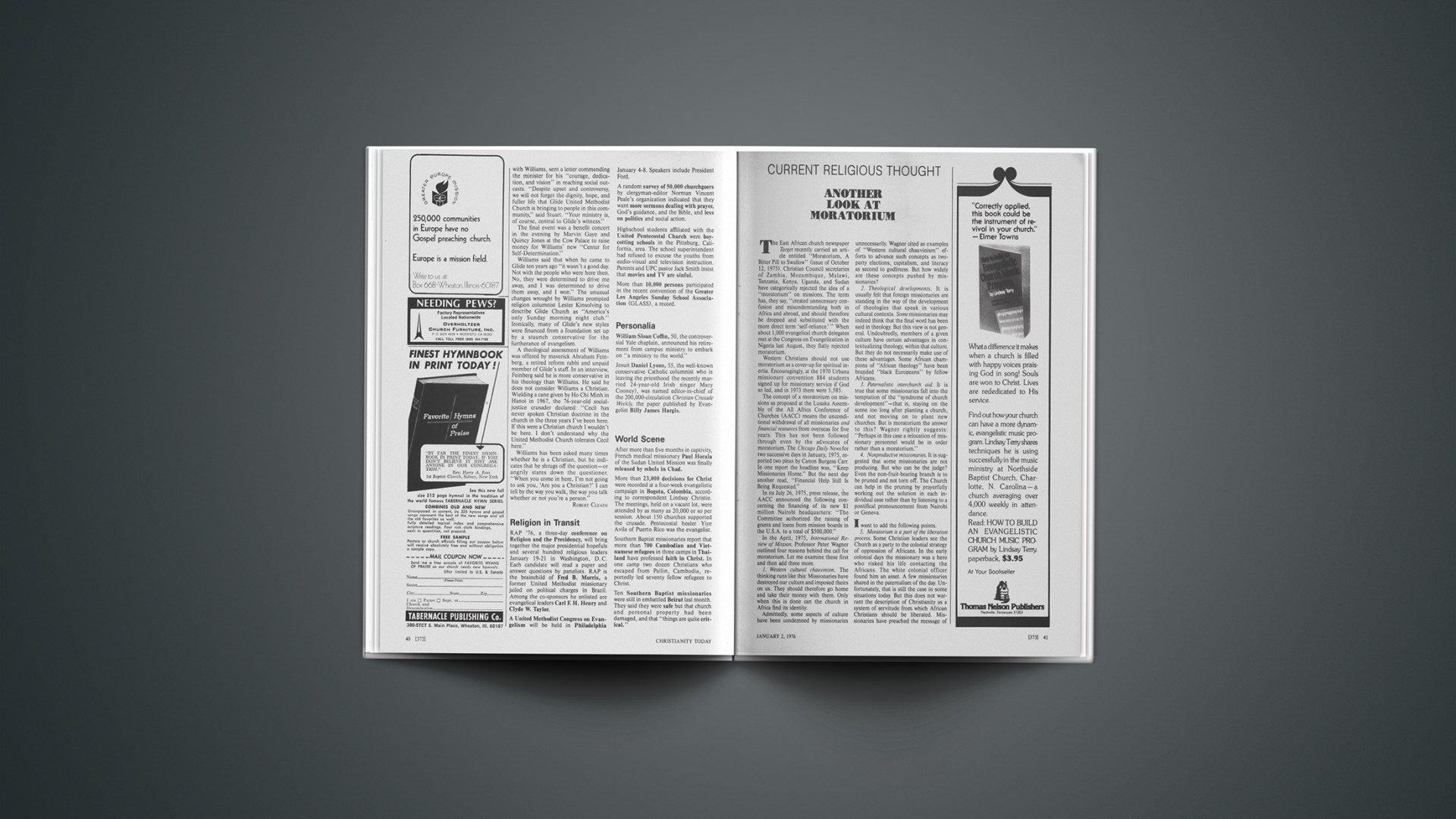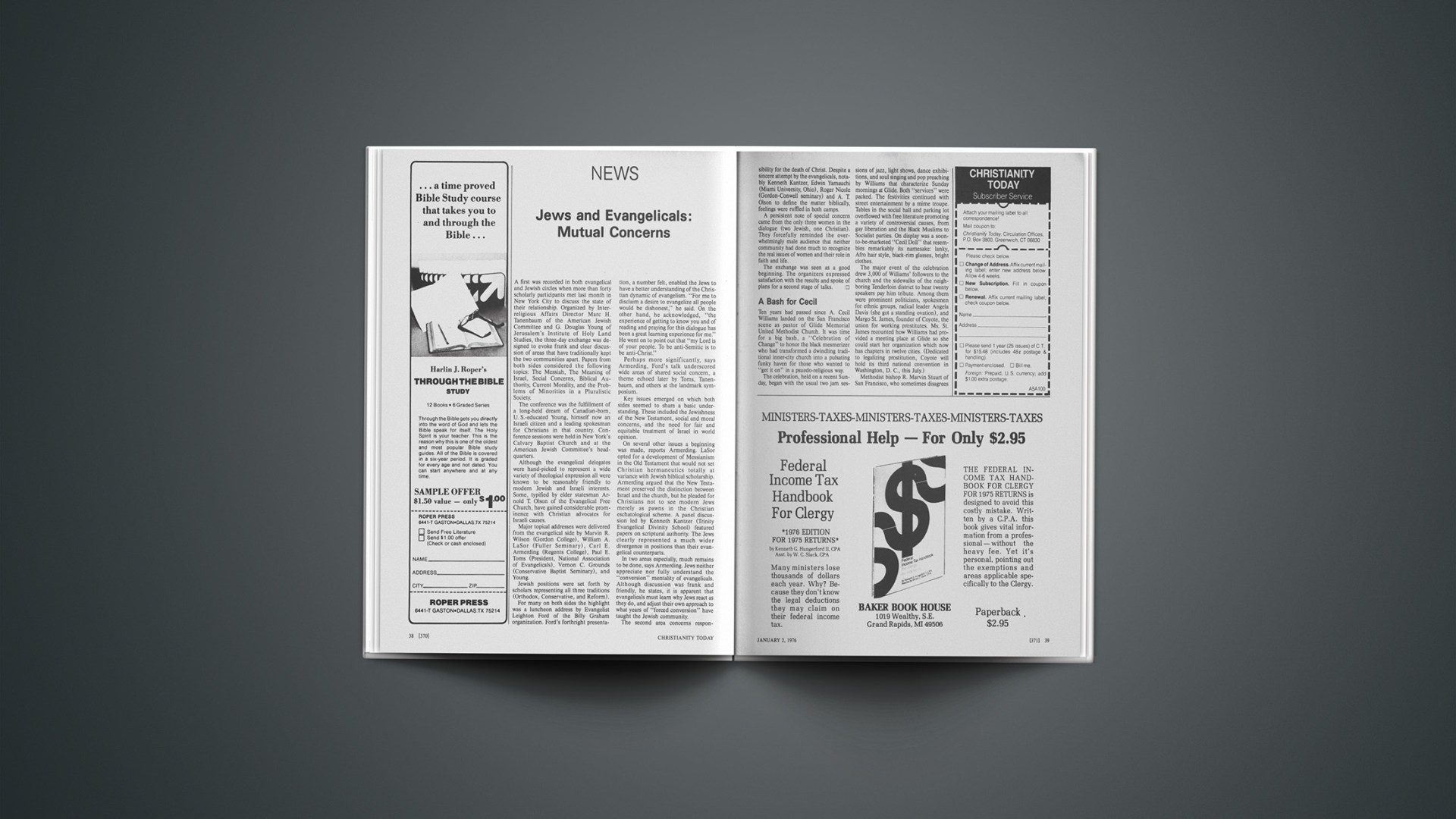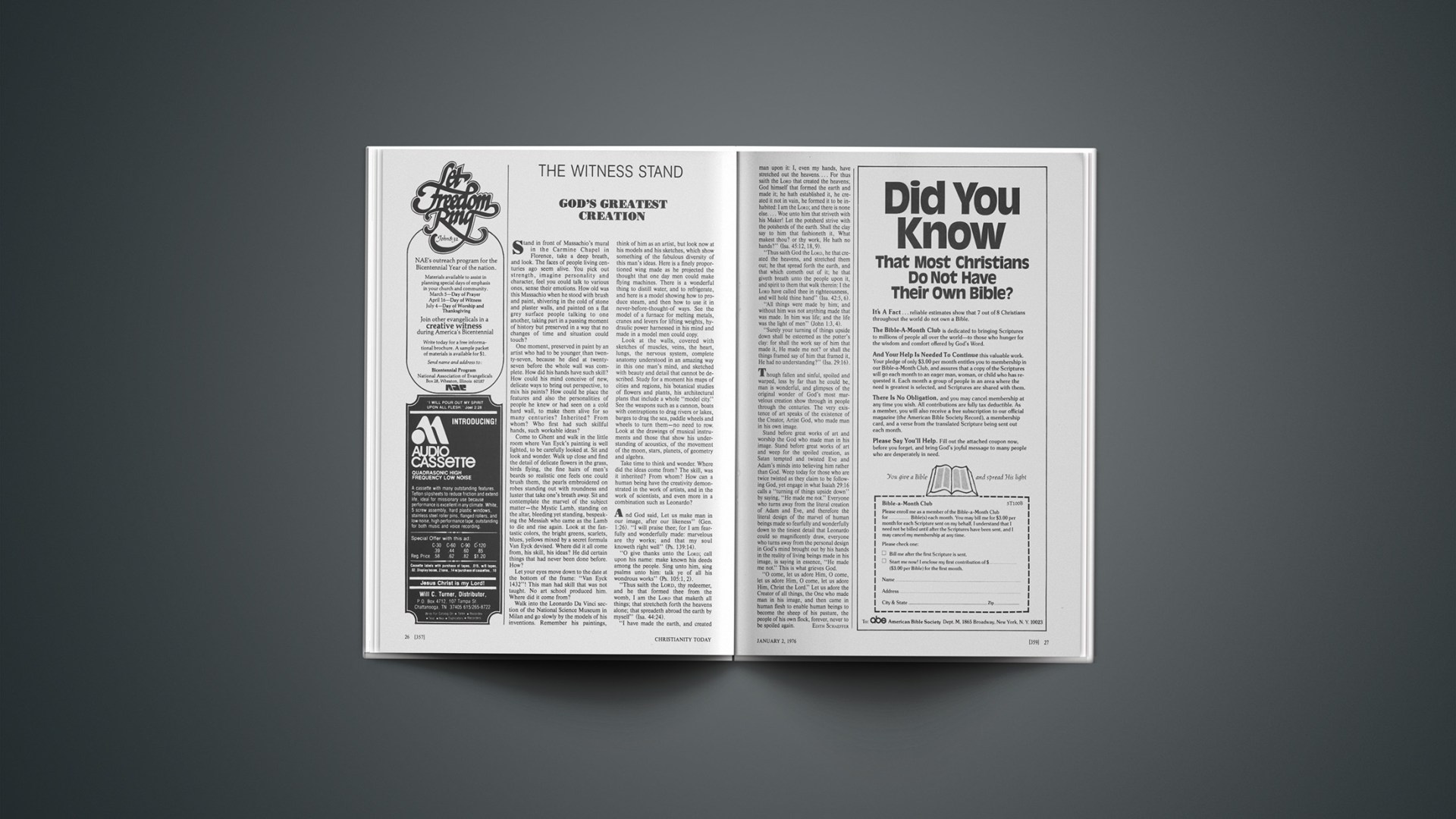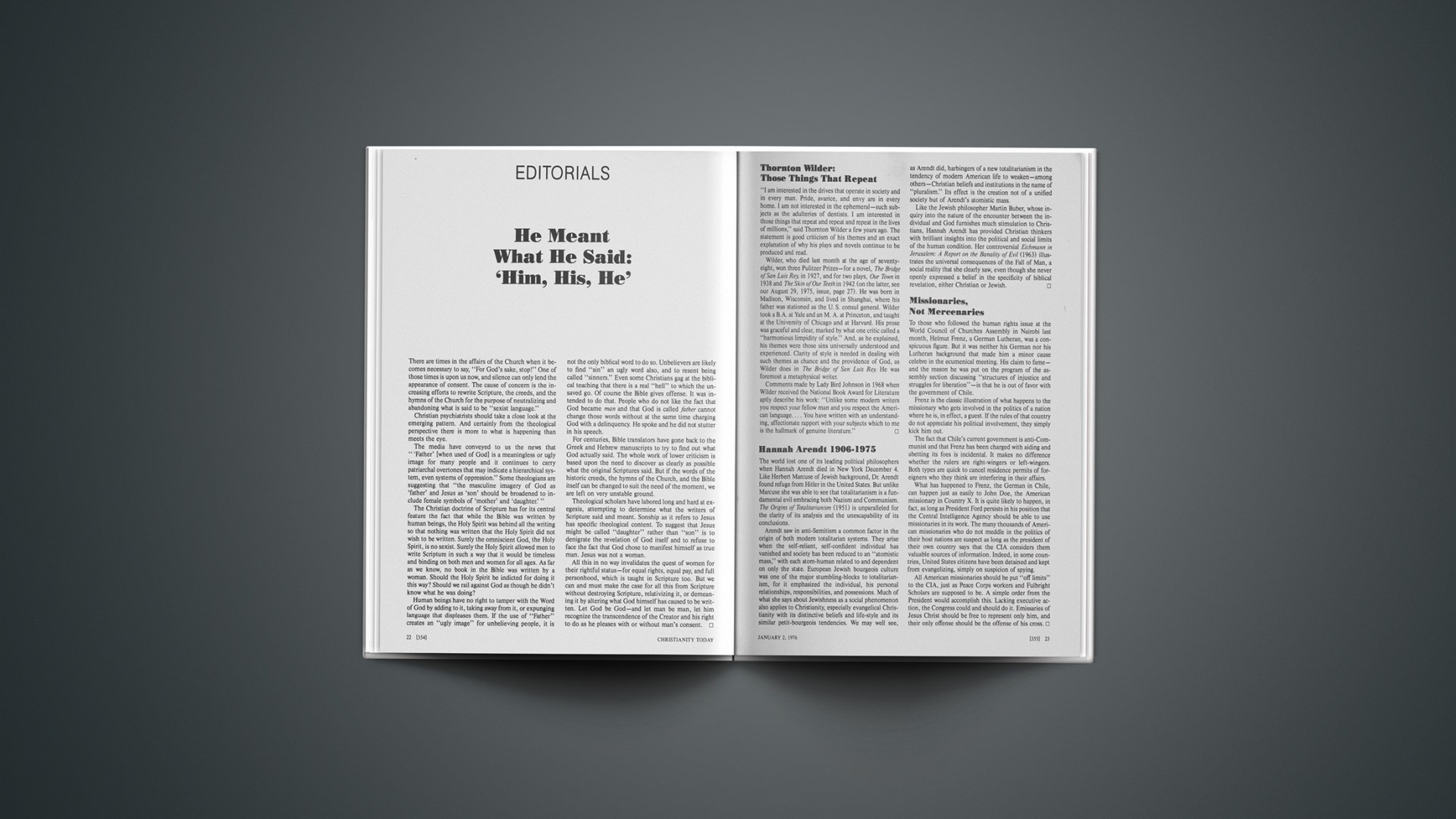While blacks and women in America have been gaining rights and a share in decision-making on the national level that they should have had decades ago, another large group of Americans seems to be losing influence. Many Christians are now strangely intimidated into silence. Their contribution to public-affairs debates is being increasingly disqualified as sectarian.
The “disfranchisement” of Christians in America, like the oppression of blacks and the ward or tutee status imposed on women, depends on myths. These myths are expressed without being clearly understood and are repeated, in many cases, by the very people whose interests they suppress. Undoubtedly the myth of white supremacy intimidated a substantial portion of the Negro population for decades, substantiated as it appeared to be by the continuing relegation of the Negro to servile or inferior status. But at a certain point in their history, blacks repudiated it. And once its existence was acknowledged, it was rather quickly rejected, in principle at least, by whites as well.
What of the status of women? We should distinguish between the biblical distinction of the function and role of the two sexes, accepted by all biblical Christians, and the complex of social and cultural attitudes now customarily if somewhat oddly entitled “male chauvinism.” Needless to say, such a complex of attitudes, particularly when it was accepted or at least to some extent unresisted by women themselves, was a powerful factor in keeping them from enjoying the full measure of the dignity with which the Creator endowed them as well as the formal rights to which the Constitution and public laws entitle them.
The situation of Christians in America today, like that of blacks and women only a short time ago, also suffers from the prevalence of a derogatory and harmful mythology, substantial elements of which are accepted by Christians themselves. Not until Christians recognize that they are kept ineffective in a society major facets of which they themselves have shaped will they recognize the prevalence of these debilitating myths and do something to eradicate them from popular consciousness. Like the androcentric myths of male supremacy, the secularistic myths of Christian inferiority represent a whole complex of attitudes and assumptions. Their effect, unless bared and renounced, can put believers in a position that anti-Christian forces easily exploit.
Ours is an age of slogans rather than of mythology so called, and we may identify elements of the myth of Christian inferiority in terms of generally accepted slogans that support and maintain it. Consider the currently fashionable catchword “pluralism.” In a “pluralistic” society such as ours, we are told, no one group should dominate or impose its opinions on others.
“Pluralism” is a concept void of content. It can mean everything or nothing. As Professor Perry London of the University of Southern California pointed out at a recent Wheaton College conference, the political freedoms of which Americans are justly proud—freedom of speech, freedom of religion, freedom of association—have their origin in a relatively homogeneous society in which there was a broad consensus on fundamental values. A considerable degree of freedom could be allowed because there was a wide measure of agreement and self-discipline concerning the limits within which freedom was to be exercised. As the consensus has deteriorated, the limits have been forgotten, and the exercise of freedom in various areas is pushing toward extremes that will unravel the fabric of society and ultimately force upon us a desperate choice between chaos and authoritarian control.
Early America was “pluralistic” within a Christian context. No one was obliged to worship God according to the manner of one particular group—e.g., Congregationalist, Episcopal, or Baptist—but it was rather generally taken for granted that most Americans would worship God within the framework of one or another branch of the Christian tradition. Those who placed themselves outside the tradition—Jews and other members of non-Christian religions, freethinkers, and atheists—were few in number, and society could easily accommodate their diversity without danger to its fundamental cohesion.
To speak of “pluralism” in a context in which those who wish to revere God and those who militantly deny his existence have equal status would certainly be awkward, but even this would not be an absurdity for the Christian. If he were expected to accept the fact that public institutions and ceremonies would at times be indifferent to God and appear to presuppose the autonomy of man, he could also expect that the atheistic minority, in the name of pluralism, might tolerate the occasional expression of public reverence for God and the presupposition of his sovereignty in certain public institutions and ceremonies. But this is precisely what “pluralism” as currently understood does not do. It never allows public institutions to reflect the views of the theistic and nominally Christian majority; in fact, it demands that they explicitly repudiate them and affirm the autonomy and self-sufficiency of man, a concept as odious to Christian minds as it is untrue to objective reality. It is as absurd to think that substantial actions could be launched to prevent astronauts from public reading of Bible texts while traveling at government expense as it would be to suggest that they ought to be prevented from not reading them. But somehow a commitment to “pluralism” permits the one and inhibits the other. It is just another element in the mythology that effectively keeps Christians in America from contributing any of that which is most precious to them to general public discussion, even when it is concerned with ultimate values and the nature and destiny of man.
Another area of modern American life in which the substantial weight of the Judaeo-Christian ethical tradition has been explicitly rejected in favor of a permissiveness derived from paganism is the continuing controversy over abortion on demand. From the historical perspective, the overwhelming testimony of Christians from the earliest days to the present has been one of opposition to abortion except in cases involving a serious threat to the life of the mother. Major Protestant ethicists, including in our own generation figures as diverse as Barth, Bonhoeffer, Thielicke, Ramsey, Outler, and Schaeffer, agree on this point. Yet, as it happens, several major American denominations support not merely a limited liberalization of abortion but the unique access to abortion on demand created by the Supreme Court in January, 1973.
Christians suffer from intimidation and oppression in our American culture. As blacks and women have done, we must reject the mythology that debilitates us.
What has led denominational Protestant executives to break so dramatically with the ethical standards of Christendom during almost two millennia? What consideration could be strong enough to persuade not only many leaders of liberal or less-than-biblical denominations but also a number of conservatives thus to repudiate a major and constant element of the Christian ethical heritage?
Incredibly, nothing more seems needed than the slogan “freedom of choice.” For instance, at the recent International Conference on Human Engineering and the Future of Man, several participants said in discussion that they personally deplored abortion on demand but nevertheless supported “freedom of choice.” Such an attitude reveals a grave defect in logical and moral reasoning: Christians’ willingness to accept it as a valid argument on a substantial issue suggests that we are losing our influence on public policy less because it is being wrested from us than because we are simply lacking in basic intellectual tools and discipline.
“Freedom of choice” is a slogan, not a position. It contains everything and nothing. Another word for choice is decision, and choice or decision-making is the chief issue in ethics. The task of ethics as a discipline is to teach and enable people to make right choices. Unless one has freedom to choose, one cannot make an ethical decision. But unless one uses one’s freedom to choose the right, the decision is unethical and immoral.
If by “freedom of choice” we mean that people should be allowed to use their free will to make either an ethical or an unethical decision, without suffering for choosing unethically, we are engaged in an absurdity that, if carried to its logical conclusion, would put an end to public law. The man who has been cuttingly insulted may have to choose between an act of vengeance and acceptance of his humiliation. Factually he has the potentiality—in other words, the freedom—to choose either course, vengeance or patience. But it would not occur to us to legalize the vendetta on the grounds that we must permit freedom of choice. Those societies and subcultures that permit or even require an offended individual to seek to avenge himself justify it not as “freedom of choice” but as an ethical decision made, for example, for the sake of an ethical good such as personal honor. By saying that we must allow “freedom of choice” in the abortion/right-to-life issue, we cannot really mean that we advocate freedom to choose between an ethical and a radically unethical course of conduct.
In this respect, to advocate “freedom of choice” is a more serious moral error than merely to support freedom from punishment. Homosexual acts have long been punishable by law in many societies. A Christian might legitimately argue that such acts should be free from punishment, on the grounds, for example, that the attempt by the state to restrain homosexual behavior by the penal code is ineffective and produces more abuses than it hinders. But for a Christian to argue that homosexual behavior should be legitimated in the name of freedom of choice is not really to support the general principle of freedom of individual decision; it is, rather, to remove this particular area of decision-making from the moral and ethical sphere, and thus to break drastically with biblical teaching and the Christian moral heritage.
The widespread acceptance of the slogan “freedom of choice” among Christians is more likely to stem from defective training in moral reasoning than from an explicit rejection of biblical teaching or of the Christian’s right to a voice in the formulation of public policy, but the end result is the same: Christians are in effect disfranchised, and society as a whole is deprived of the value of any ethical insights drawn from or embedded in our biblical heritage. A liberal society in which there is no attempt to write laws on a theocratic basis may frequently reject such biblically derived insights or decline to embody them in its public laws. However, the Christian has every right to share such insights with society at large and to attempt to persuade it of their validity.
lt is absurd to espouse a ‘freedom of choice’ that allows people to do evil rather than good, with no thought given to the consequences.
No American historian would seriously contend that the phrase “regarding an establishment of religion” in the First Amendment means anything other than what it says: it forbids the establishment of a national religion or church. It did not in fact forbid the establishment of state churches, as both Massachusetts and Connecticut had them at the time of the amendment’s adoption and retained them for many years to come. The limitations of federal power contained in the Bill of Rights have subsequently been extended to apply to the individual states as well. Yet even when applied to the states, the First Amendment means only that no state may establish a state church, just as the federal government may not establish a national church. It certainly did not mean, in its conception, that nothing in public law or policy may reflect the convictions or insights of any church or of the Christian religion.
It is absurd to suppose, as the Supreme Court did in a 1961 decision on prayer in public schools, Engel v. Vitale, that the recitation of a prayer in public school constitutes an “establishment of religion” in the sense of the First Amendment. In fact, the Court’s reasoning in that case was based more on the contention that the state authorities of New York, in formulating or designating a prayer, were becoming “entangled” in a religious issue rather than on the obviously absurd contention that they were thereby establishing a religion.
The transition from the precise and limited prohibition of establishment to a general and all-embracing prohibition of “entanglement” is another way in which the influence, convictions, and counsel of Christians are rendered ineffective. The doctrine of entanglement is derived from a concept that is not constitutional in origin (although it goes back to one of the Founding Fathers, Thomas Jefferson), namely, the “wall of separation” between church and state. Even though Jefferson himself was opposed to revealed religion and wished to reduce the influence of the Christian churches in American society, his concept of the wall of separation was far less noxious in the early nineteenth century than it has become in our day. In Jefferson’s day, government at all levels was extremely limited; there was no compulsory education, for example. Hence to insist on a rigid separation, an exclusion of the church and religion from all areas of state activity, represented far less of a repression of religion and its relegation to the fringe of social life than a similar insistence does today.
According to a recent ruling of the United States Supreme Court (Meek v. Pittenger, 1975), states are forbidden by the First Amendment from providing services such as remedial reading therapy for slow learners in private, religious schools. A state-paid therapist working in a religiously oriented school, the Court reasoned, might be subjected to certain pressure to conform to the religious orientation of the school. This would make it necessary for the state to act as a watchdog to protect the freedom of conscience of its therapists from such religious propaganda, and this watchdog role would then “entangle” the state with religious issues in an unconstitutional way.
The result of this is that parents of children with learning disabilities are triply disadvantaged if they choose to provide religiously oriented education for them: first, because their children are handicapped, which itself alone constitutes a heavy emotional and psychological burden for the children and their families; second, because they must themselves support the private school in addition to being taxed for public facilities they do not use; and third, because they also must pay separately for private therapy provided by the state free of charge to those who are willing to cooperate with the government educational system.
The reasoning involved is so contrived that one must look behind it for some motivation other than that given. It would seem that the Court, consciously or unconsciously, is intent on increasing the cost to individual parents of not submitting to the state-run educational establishment. In other words, the long-range effect of such regulations is to price independent schools out of the market for all but the very wealthy. Thus, without actually closing or forbidding them, the government ultimately will effectively eliminate non-government schools and thus strike a heavy blow against the “pluralism” and “freedom of choice” it so greatly extols in other matters.
Before the government assumed responsibility for so many areas of human life and development, elementary and secondary education were relatively inexpensive, and millions of people of modest financial means were able to provide alternative schools for their children. Additional special educational services, such as remedial education, generally had to be provided outside the schools in any case. It is evident that when the state starts to provide such services on a broad basis, but only for those who are willing to buy the whole package of government-planned education, it is subjecting religious beliefs to a kind of financial discrimination.
Separation of church and state does not mean the systematic exclusion of anything religious from every aspect of life involving the state.
For the sake of argument, we may assume that there might be valid political and sociological reasons for such discrimination, and perhaps the majority of Christians would accept such reasons as sufficient. But it should be recognized that discrimination, not impartiality, is precisely what such decisions as Meek v. Pittenger involve. They are not interpretations of the “separation of church and state”; they are implementations of a policy of suppression of the church by the state. At present, such implementations are mild and relatively innocuous. But Christians should be aware that this is where present legislative, judicial, and regulatory trends are headed, and recognize that, carried to their logical conclusion, they will result in the relegation of Christians and their Christian convictions to the fringes of their own society.
The doctrine of the separation of church and state, if it refers to institutions and organizations, is salutary and acceptable. If it is interpreted to mean the systematic exclusion of all religious attitudes, insights, and values from every aspect of life and every square foot of space where the state exercises a measure of involvement or regulation, then it is illegitimate and represents nothing less than a long-range program for the suppression of religion, and specifically, of the most widely represented and active religion in America, Christianity.
Perhaps the indifferent majority of Americans who bear the name of Christian but do not exhibit any consistent Christian convictions in their lives may some day be supinely subjected to the activistic minority who would like to restructure society on fully secularistic principles. This has happened elsewhere in the world; there is certainly no guarantee that it will not happen here. But when Christians themselves promote an increasing disfranchisement—and, in the long run, their own relegation to outsiders and second-class citizens in their own society—by giving automatic, quasi-religious assent to the fullest expansion of doctrines such as the separation of church and state, they are as foolish and self-destructive as the Negroes who tolerate the myth of white supremacy.
Faced with these trends, the Christians of America must take some prompt measures. In fact, if it is true, as Tertullian wrote to a pagan Roman audience, that the Christians are to society as the soul is to the body, then Christian efforts to protest the Christian aspects of our society and civilization are in the interest not merely of Christians but of society as a whole.
First of all, Christians must learn to apply more rigor in their moral reasoning. They must, for example, learn to distinguish between a principle that has a definite content, such as the commandment against false witness, and one that is merely an empty, adaptable slogan, such as “freedom of choice.” If pluralism means that committed Christians are not to impose their convictions on the nominal Christian majority or the non-Christian minority, then it must also mean that Christians can expect that society not attempt to suppress or discredit their convictions and rights.
Second—because the process of education in moral reasoning will take some time—Christians must challenge the slogans, the “sacred cows” of modern Americanism that serve as convenient tolls for the destruction of Christian institutions and values. As a beginning, every time a Christian encounters the slogans “freedom of choice,” “pluralism,” and “separation of church and state,” he must challenge them, require the person voicing them to give them a specific content, and deal with them then not as doctrines deserving of mythological or quasi-religious reverence but on the basis of the specific content that their advocates ascribe to them.
Third, Christians must acknowledge that if God has placed them in a largely non-Christian society (at least in the sense of genuine commitment, as opposed to merely nominal Christianity), it is not in order that they be transformed by it, but for its healing and transformation by them. Can God expect less of Christians than that they at least have the courage to attempt to persuade non-Christians that the organization of society according to Christian, biblical principles to the advantage of all?
Conversely, if Christians, who through our historical development have been the trustees of most of the ethical and moral widsom of our civilization—for it has come to us through Christian sources—refuse or are too timid to share it with others, they are depriving the whole nation and all its people of a good of which they are supposed to be stewards and disseminators, not mere warehousemen. What this simply means is that it is a Christian duty to proclaim to all society, not just to the like-minded, the social value of the laws, principles, and insights that we derive from our biblical heritage, but that correspond in their ultimate validity to the nature of man as a creature made in the image of God.



